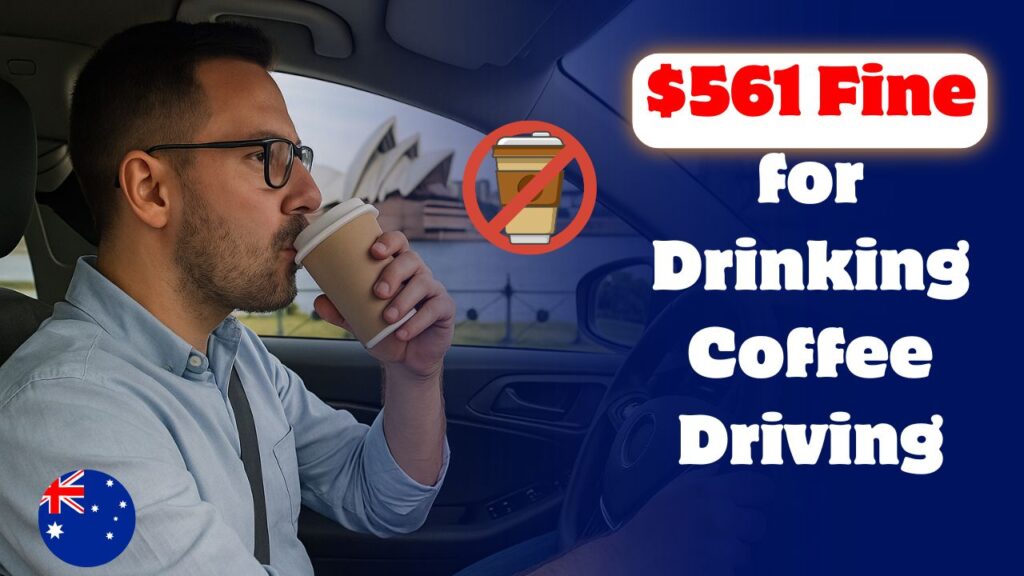In a surprising update to Australian road safety regulations, drivers across the country are being warned about new penalties linked to distracted driving. Under the updated driving law, anyone caught sipping coffee, tea, or other beverages while operating a vehicle can now face a hefty $561 fine. Authorities claim the measure aims to minimize distractions that lead to thousands of road accidents annually. This strict enforcement highlights how even small actions behind the wheel can have major legal and safety consequences for Australian motorists.

Australia’s New Distracted Driving Law Explained
The revised Australian driving laws for 2025 expand the definition of “distracted driving” to include holding or drinking any beverage while in control of a moving vehicle. Previously, these penalties were mainly focused on mobile phone use. However, research by the Australian Transport Safety Bureau (ATSB) showed that handling hot drinks can cause similar reaction delays as texting. The $561 fine will apply uniformly across most states, with possible demerit points added depending on jurisdiction. The rule reinforces the government’s zero-tolerance stance on unsafe driving behaviors.
Penalties and Enforcement for Coffee or Tea While Driving in Australia
Under the 2025 traffic amendments, Australian police are authorized to issue immediate fines to drivers observed consuming beverages such as coffee, tea, or energy drinks. These are treated as “driver distraction” offences. In New South Wales and Victoria, this could mean losing up to 3 demerit points in addition to the $561 fine. Roadside cameras and dash footage can also be used as evidence. Authorities emphasize that these measures are not merely punitive but preventive — aiming to reduce accidents caused by momentary lapses in attention while driving.
 Drinking Coffee While Driving to Draw On-the-Spot Fines – Australia Tightens 2025 Road Laws
Drinking Coffee While Driving to Draw On-the-Spot Fines – Australia Tightens 2025 Road Laws
How Australian Drivers Can Avoid the $561 Beverage Fine
To stay compliant with Australia’s new driving laws, motorists are advised to finish their drinks before getting behind the wheel or during rest stops. Drive safely by using cup holders only when the vehicle is stationary, such as at red lights or rest areas. Experts recommend planning trips with short breaks, especially on long routes. Many Australian drivers are also turning to spill-proof cups to minimize distraction risks. The best approach remains simple — hands on the wheel and eyes on the road at all times to ensure safety and avoid penalties.
Public Reaction and Expert Opinions on the Updated Driving Rule
The public reaction to the $561 fine has been mixed across Australia. While some motorists argue it’s an overreach, road safety experts praise the change as a necessary step to reduce distracted driving incidents. Organizations such as the Australian Automobile Association (AAA) note that even minor distractions can delay reaction times by up to 30%. Insurance agencies also expect fewer claims related to “inattention accidents.” This law, combined with tougher road safety campaigns, reflects the government’s broader goal of reaching zero road fatalities by 2030.
| Aspect | Details |
|---|---|
| Fine Amount | $561 (nationwide, may vary slightly by state) |
| Demerit Points | Up to 3 points (depending on state regulations) |
| Offence Category | Distracted Driving / Unsafe Driving Behavior |
| Applies To | All drivers handling or drinking coffee, tea, or beverages while driving |
| Effective Year | 2025 onwards |
| Purpose | To reduce distraction-related road accidents and promote safer driving |
FAQs
Q1: Is drinking water while driving also fined in Australia?
A1: Yes, if it distracts the driver or affects control of the vehicle, it can attract a fine.
Q2: When did the $561 distracted driving fine come into effect?
A2: The fine applies from early 2025 under Australia’s updated road safety laws.
Q3: Can police use camera footage to issue fines?
A3: Yes, traffic cameras and dash footage can be used as valid evidence for issuing penalties.
Q4: Do all Australian states follow the same rule?
A4: Most states have adopted the $561 fine, though demerit point deductions may differ.





